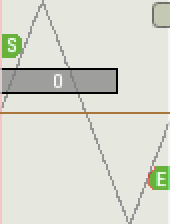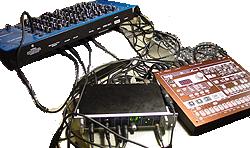View current page
...more recent posts

"Song 13 (Quatrains)" [mp3 removed]

"Song 12 (Simple Waveforms)" [mp3 removed]
A few thoughts on science fiction:
I'm embarrassed to say I don't think about the future much, other than serious unease about what we're doing to the planet and what steps we could take to lower our "carbon footprints." The writing here is fixated on a relentless present, which makes it hard even to look back at the past of what's already been said. (Although no one could be as amnesiac as the hapless Kevin Drum, who claims not to remember what lefty bloggers were saying before the Iraq War started.)
I still read a lot of science fiction but I think of it as travelling laterally in time, to parallel universes where technology has had this or that effect, or as a Swiftian satire of our moment. Or pure escape into a visionary world. I'm not apologetic about the latter, as long as the "visions" aren't too much about simple, obvious adolescent wish fullfillment ("If I could fly I'd show them!")
The film critic Raymond Durgnat once talked about the "mute poetry of the commercial cinema," such as a poignant shot of items in a display window in an otherwise awful film. That's what I'm most interested in in sf--the poetic content of imagining the future, which speaks to our time as opposed to just reiterating past writing conventions (e.g., having a character using a computer in a present day novel that is otherwise 19th Century in its structural particulars).
Retail demographics.
Hadn't been in the Midtown stores I used to haunt in a while and noted some changes:
1. The sequencer/groovebox listening room at Sam Ash is gone. There are still a couple of Akai sampling workstations you can demo in the main keyboard room, and two Korg Electribes locked in a glass case there. It looks like software has been expanded but it's hard to say--the boxes are spread around the main room incoherently.
2. The bookstore at the Virgin Megastore has been cut back in floor area. The section outside the cafe formerly devoted to new releases and graphic novels is now T-shirts and I Heart NY tourist crap. Inside the bookstore, shelves have been removed to accommodate a new store area: TV shows on DVD. Science fiction books are down to about 3 shelves, mostly novelizations of movies and TV series.
3. The Loews threatre inside the Megastore, which used to be "state of the art" in the mid '90s, fell on hard times and is now closed. They are using the lobby to store DVD shelving units.
Looks like I'm not the only one spending all my time online.
Science fiction diary. Spent a few days commandeered by the paranoid, smarter-than-thou mind of A. E. Van Vogt; after finishing The War Against the Rull, the Weapon Shops cycle, and Voyage of the Space Beagle I felt like I'd been let out of prison. Someone (David Pringle?) described his books as "visionary but slapdash" and that's true but the author has this quality of certainty about the futuristic folderol that's more than a little scary. He's constantly talking about "superior systems of thought" that are mostly just mind control techniques. You can see why he embraced Dianetics in the '50s (he later unembraced it)--it would appeal to the brain that conceived Nexialism in the late '30s (a cross disciplinary hybrid of all sciences), built a series of novels on non-Aristotelian logic (I didn't like The World of Null-A much), or conceived the "guns against the government" libertarian credo of the Weapon Shops (a scheme dependent on the machinations of an immortal superman working behind the scenes).
Pringle, in his seminal Science Fiction: The 100 Best Novels, considers Charles Harness' The Paradox Men to be the best book Van Vogt never wrote. It, and the later tome The Ring of Ritornel combine some of Van Vogt's swashbuckling medievalism (both Harness novels take place in a future feudal society) and wild leaps of imagination, but are much more satisfying and conceptually tight, and you don't intermittently wonder if the author is crazy. The stories have posthuman themes that anticipate cyberpunk and a strain of quantum mysticism that later comes to full flower in the writings of A. A. Attanasio. Paradox has a character called the "Meganet Mind," a horribly disfigured former circus freak who spends all his time plugged into a vast computerized library (this was written in 1953), and Ritornel features a former poet laureate whose brain is removed and wired into a computer called the Rimor, which dispenses verse and song for a depressive Emperor.
The "disembodied identity" is a constant of Attanasio's. In Radix his Voors are aliens feeding on the energy spraying from a collapsar who eventually become trapped in human bodies, living out their years as vampiric soul-eaters. In Solis the main character is the brain of a man who has himself frozen for posterity only to wake up as a machine component. In several AAA books the dead continue to live as gradually-dwindling packets of photons. Harness presages all this with the Rimor and also his characters in Ritornel who go into "the Deep" between galaxies and reemerge as antimatter beings, walking among normal humans by means of matter-protecting skin prosthetics. And speaking of the space between galaxies, to bring this full circle to Van Vogt, there is nothing quite like his image of a red horned devil creature hovering in that trackless void only to be awakened after aeons by a passing earth vessel. This is the basis of the plot that became the movie Alien--the creature is taken into the ship and begins laying eggs in the crewmembers' bodies.

"Song 11 (Magic Fingers)" [mp3 removed]
Deleted background instruments in photo inspired by this post [link removed] on "unwitting Baldessaris."
Hacking vs Defaults, an argument about types of Internet art in table form by Guthrie Lonergan. The blog you are reading is proud, yet...humble to be included in the scheme. For more Defaults than you can possibly consume at one sitting see the Year in the Internet 2006, which includes Lonergan as curator and also Travis Hallenbeck, whose exquisite taste in the Internet is a constant inspiration.
For example, handmade plastic models of Rick Wakeman's keyboards, this Google video documenting a slow-playing cassette deck, and these great, perfectly centered photos of food.
 The Year
The YearIn The
Internet
2006
"We asked some people what their top ten links of the year were for 2006. This is what they said."
- Michael Bell-Smith & Cory Arcangel
The Year in the Internet 2005
